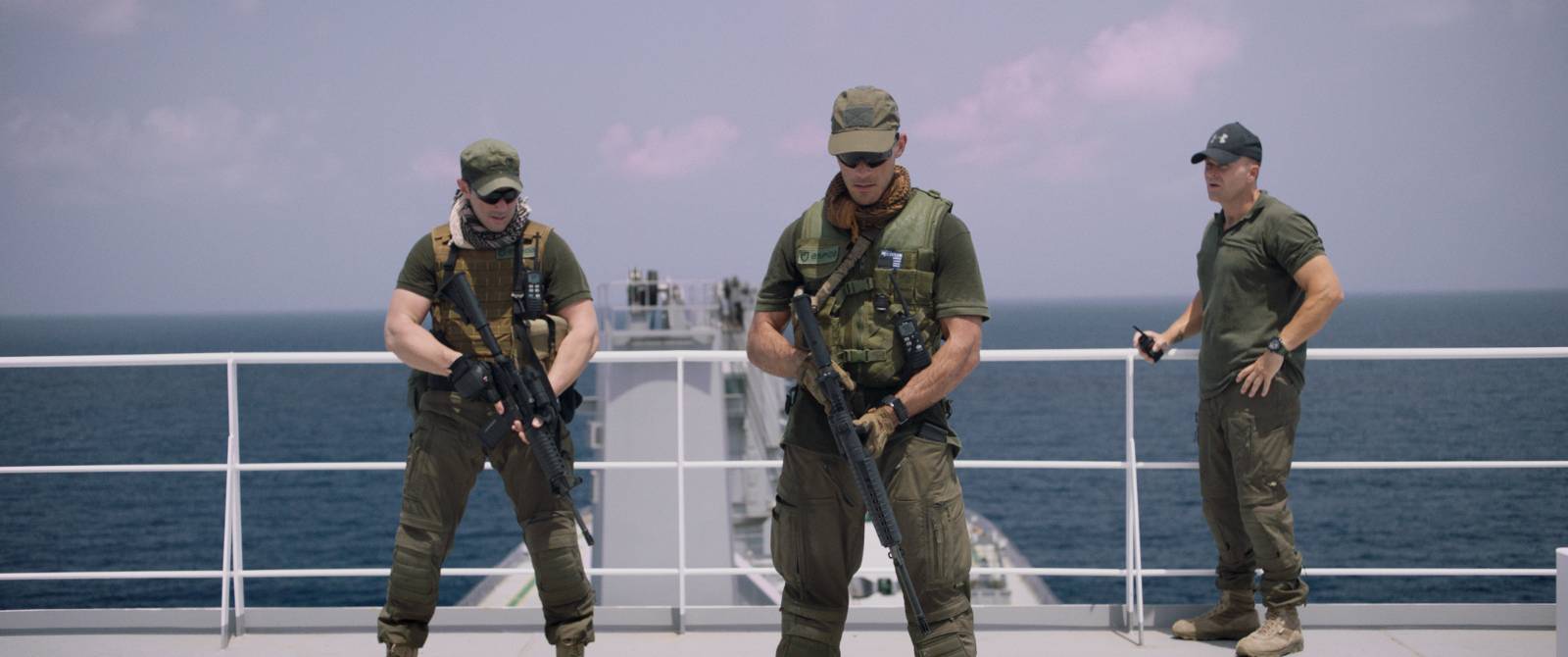Institutions dedicate extensive effort towards preparing for the future, often implementing protocols that help arrange for the inevitable, but what happens when that preparation grows obsolete? That is the question Gregoris Rentis asks in Dogwatch, which focuses on international governments’ employment of private mercenaries as response to Somali pirates hijacking ships in the Indian Ocean High Risk Area. Over the last decade, though, there have been far fewer incidents of piracy, raising the question of whether or not these precautions are still necessary in the present day.
The film highlights three soldiers in an observational triptych formula. Each symbolizes a distinct chronological phase of life, particularly within a militaristic context. We first witness the fledgling Yorgos exercising and performing combat routines during his deployment in Sri Lanka. The established Costas proves his worth to his comrades after being debriefed about the current methods Somali pirates exploit. And a timeworn Victor seeks ways to continue serving maritime security for the rest of his days while still being involved in his son’s life.
All three men have made sacrifices in their journeys to become a mercenary. They left behind families before arriving at their posts and soon became isolated from most facets of typical human reality. They must continually endure their absence from familial settings and obey commanders’ orders dutifully. The only things they can claim as their own are their bodies and integrities; that sense of physical self becomes a critical part of their arsenal for coping with their situations. All of this was to be expected, though, when they became mercenaries: soldiers that served a mission greater than themselves. But over the course of their long, grueling shifts, the men’s expectations grew murky when the unexpectedly low levels of piracy made them question their purposes entirely. Through lingering close-ups of the naked torso and face, these men stand despondent during their showers as they doubt the enemy’s existence and their own careers.
The precarious nature of their employment creates both thrills and discomforts for protagonists. “Sometimes it’s nice living on the edge, and sometimes it’s not,” Costas says to a fellow guard as they discuss normalcy when glancing at the sky. He seems rather disappointed when out of contact with the hijackers. Though well-paid, Costas feels his employer failed to uphold this promise. As the men go through rough, formidable patches in their narrative, Rentis blurs the line between fiction and non-fiction with stunning, intimate cinematography that captures the leads’ emotional and psychological minds. He utilizes absurd comedy to critique the hyper-macho patterns in the maritime and demonstrate the toxic nature of these approaches.
Though the film is visually gorgeous and does a wonderful job encapsulating fears and redefining safety, its theme of growth has minor shortcomings. The men only partially process what they learned from their experience at sea. Due to different introductions of Yorgos, Costas, and Victor, the film needs to give space to reflect on their individual circumstances. Thus it has a brief period of simply imparting exposition then proceeding straight to the next chapter without fully examining this information. But this can be forgiven when these themes are revisited in the end as Victor’s spouse tells their son to punch like his dad. It implies that toughness is taught––not inherent––and suggests how that is perpetuated for many men to come. Dogwatch is a grim, witty look at how preconceived notions of masculinity shape one’s beliefs, tastes, and outlook while also poignantly portraying how physical touch is psychologically embedded with traces of connectedness, competition, and belonging.
Dogwatch made its North American Premiere at True/False 2023.

